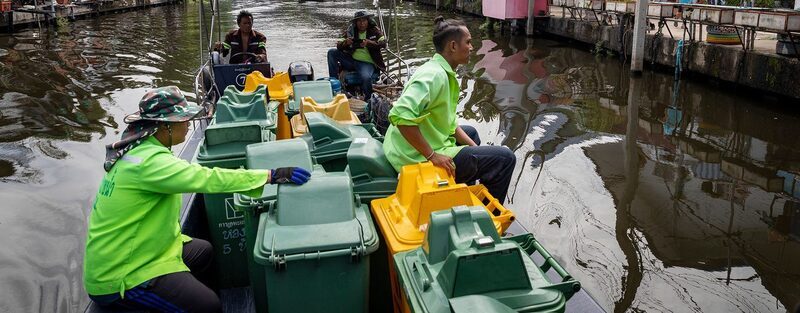By
Marwa Nassar
-
-
The private sector in Thailand is playing a pivotal role in implementing the United Nations Sustainable Development Goals (SDGs). For example, one company is manufacturing ‘biocups’ from palm trees rather than plastic cups from oil, another is trialing electric motorcycle taxis in a neighborhood of the Thai capital, Bangkok and yet another is aiming to recycle 500 billion bottles a year by 2025.
The United Nations and members of the Global Compact Network of businesses in Thailand are already working in exciting and practical ways towards a more sustainable post-pandemic world.
Some companies are working with the government and other organizations on environmental legislation, while others are investing in IT education in schools so that the next generation of Thais are skilled in the basics of coding and artificial intelligence.
All are contributing to the attainment of the Sustainable Development Goals or SDGs, the 17 interlinking targets agreed by the international community to eliminate poverty, provide health care for all, create a fairer and more equitable society, and protect the planet’s biodiversity and natural environment.
Progress towards the SDGs will determine the welfare of people and communities across the world, including in Thailand. Yet, a recent survey here found that there is relatively low awareness about the SDGs, especially among young people who are so crucial to the future of sustainable development. Clearly, more needs to be done to raise awareness that the SDGs are fundamentally about people and communities.
The UN estimates that 50 baht (US$1.60) per day per person would achieve the SDGs in Thailand. To achieve that benchmark, partnerships are essential. The UN’s work depends on building strong partnerships with and between governments, the private sector, NGOs, civil society and the general public, including young people. These coalitions must be based on the principles of inclusiveness and equality, ensuring that no one is left behind.
In Thailand, the United Nations is working closely with the Global Compact Network Thailand, which brings together nearly 60 business leaders from across the country, representing major companies that form the backbone of the Thai economy.
Members of the network have already pledged to invest 1.2 trillion baht (US$38 billion) in projects which will help to put the SDGs into practice, projects which, crucially, will have a tangible and positive impact on people’s lives. But more needs to be done.
Business leaders in all types of companies can help to affect change in their own board rooms, offices and factory floors and in the wider community.
Many people in the private sector are passionate about addressing development challenges in Thailand and recognize that sustainability is not just good for the corporate “bottom line” but can help companies prosper in the future and adapt to major shocks like the COVID-19 pandemic. They also understand their shared social responsibility towards future generations, to their children and grandchildren.
For leaders in the private sector to fulfill their social responsibility, they must not only steer their own enterprises, but also help to affect positive change for society as a whole, addressing both sustainability and equality.




اترك تعليقا